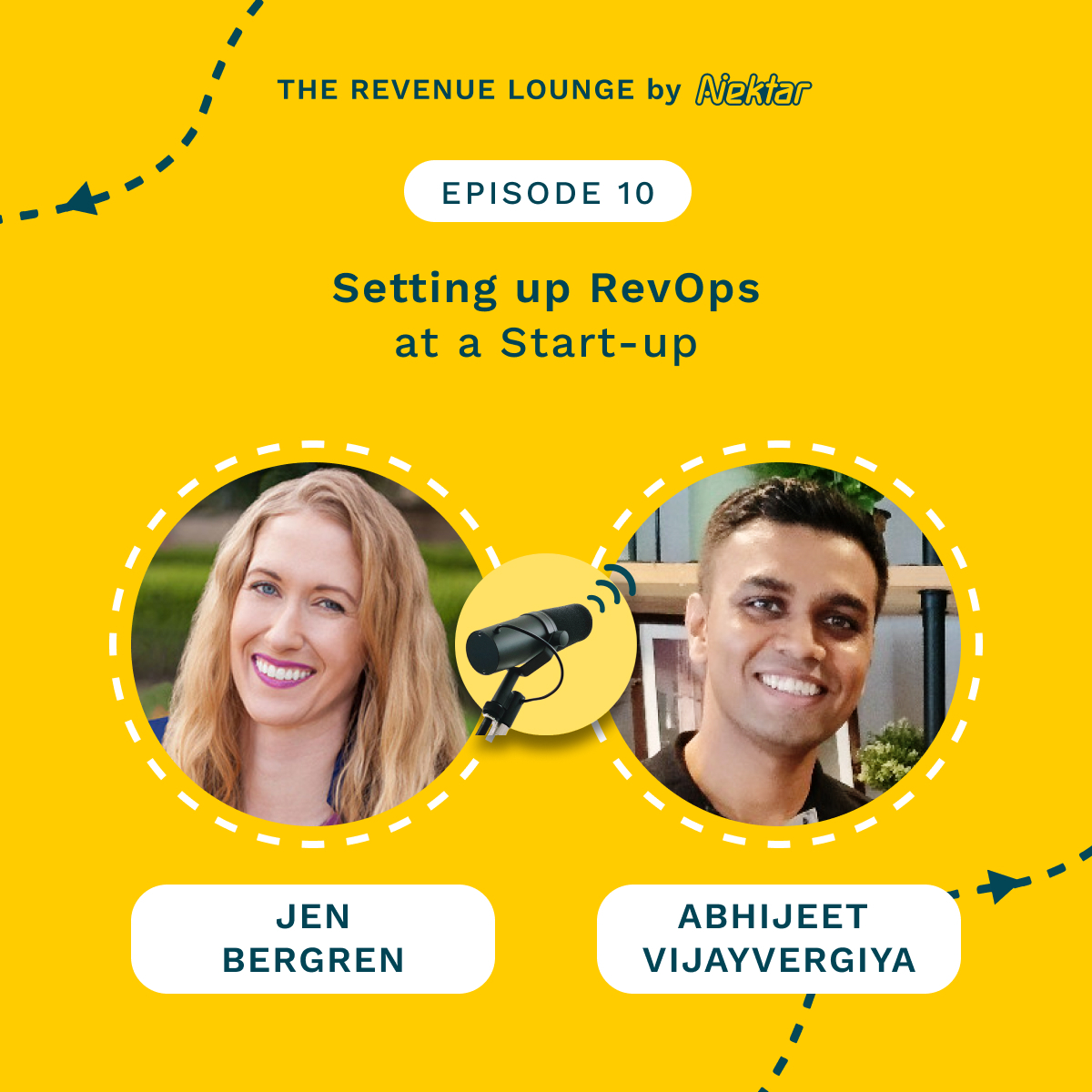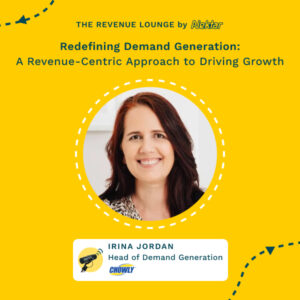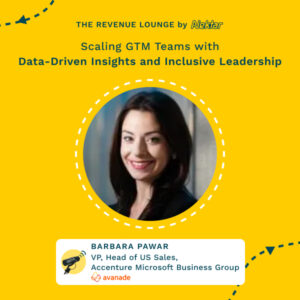Ep #5: Building the Right Revenue Operations Team Structure ft. Darren Fay
May 4, 2023
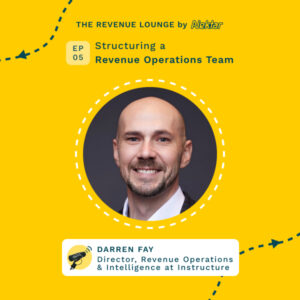
About
The Revenue Lounge
The podcast covers stories from leaders across RevOps, Sales, Customer Success, GTM, Data and Marketing about what drives these functions and what advice they would share with our listeners. With 3 seasons recorded, the podcast currently features 50+ enterprise leaders in the B2B SaaS domain. Tune in to hear from the best in the business
Welcome to Season 2 Episode 5 of The Revenue Lounge Podcast by Nektar.ai – A series of interviews with top Revenue Operations leaders on what drives the function and what keeps them going!
Episode Host – Jordan Zornes
https://www.linkedin.com/in/jordanzornes253/
Episode Guest – Darren Fay
https://www.linkedin.com/in/darren-fay/
Podcast Details:
Podcast page – https://bit.ly/3UznQ4U
Spotify – https://open.spotify.com/show/3DUOqnTpPOJ2xbyl7HdgN3
Google Podcasts – https://podcasts.google.com/u/0/search/the%20revenue%20lounge
Apple Podcasts – https://podcasts.apple.com/in/podcast/the-revenue-lounge/id1645044872
Episode Details:
When is the best time to start a RevOps function? And what should an ideal revenue operations team structure look like?
Let’s hear it from Darren Fay, Director of Revenue Operations & Intelligence at Instructure.
Want to learn more about Nektar?
Talk to our team – https://bit.ly/3MishjZ
#revenueoperationsteamstructure #buildingrevenueoperationsteam
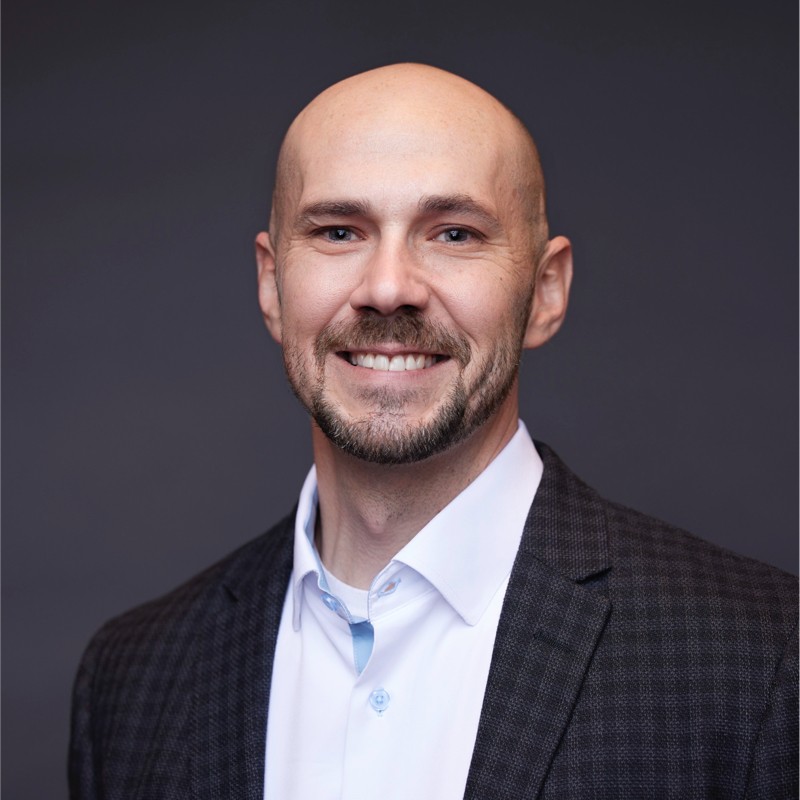
[00:00:00] Hello everyone. Welcome to the Revenue Lounge podcast. My name is Jordan, and in today’s episode, we will be talking about the building blocks of a revenue operations team and how to go about setting it up. Today with us, we have Darren Fay. Darren is the Director of Revenue, operations, and Intelligence at Instructure.
[00:00:16] Darren, would you like to introduce yourself and tell us about your role in the team manage structure? Yeah. Again, my name’s Darren Fay and I am the Director of Revenue operations and Intelligence and Instructure, and my team supports the sales organization and we support the system side and administration of our sales tech stack, as well as the business intelligence arm, which also supports our dashboarding strategy and insights.
[00:00:40] Thank you for joining us today. Just, just kind of diving in, how did you start it in structure and how did you move to your current role? Yeah. I originally jumped into Rev ops from going back into sales a number of years ago where I work for a company, sprint Corporate, which they don’t exist anymore.
[00:00:57] They’re now T-Mobile. But [00:01:00] while I was with them, I led a sales and operations team and you know, I love doing that. I have a passion for sales and I have a passion for operations through that lens. And a friend who left, uh, The company I went to, uh, SaaS company, he went to Domo, gave me a call and said, Hey, you know, you need to come check out SaaS.
[00:01:17] I think you’ll enjoy it. And I decided to make the move cuz I loved working with this person. And we used to compete in sales quite a bit together. Jumped into a sales roll over at to Domo and then from there, Got headhunted to build a business development team and a, uh, revenue operations team over at Claine, a smaller tech startup.
[00:01:34] And from there moved over to Instructure where I’m sitting in my role that I met today. You know, I have a joke when I look back at my career that the only time I entered data in Salesforce was when I was not doing my job. I don’t know if that resonates. But when you got into rev ops, how was that transition, especially leading a team that’s responsible for.
[00:01:55] Entering data and then you know, the team that’s responsible for the architecture and CRM. Yeah, you [00:02:00] know, I think it, it is a unique perspective. I do think almost everyone who at least sits in like a BI or more strategy related role in revamps should, would benefit from carrying a bag. You know, I think you understand the people you’re serving more, so you’re like end user, end customer and having the opportunity to.
[00:02:18] Focus in on the experience that a sales rep goes through and how to optimize that process and, you know, lead to, to more revenue through, uh, operationalizing the way they do their business. And, you know, if you come it from just a, a standard systems approach. You’re looking at purely from prioritization of the different requests you get and things of that nature.
[00:02:40] And you get stuck in this operational framework rather than focusing on the impacts on the business, which is where sales spends the majority of their time. And for in structure specifically, you’ve stood up a bi t m as part of your rev office org? Yeah. In structure, we have our organization’s led by a senior vice president of revenue [00:03:00] operations at China, Fink Hauser.
[00:03:01] And the way we’ve have that organization split out is we have. An arm for sales, customer success or customer experience renewals and marketing. And uh, from there we have our business intelligence leaders that are running those arms of those businesses. And from there they have a systems teams that are report into them.
[00:03:22] And think of it as the BI team and strategy team are the people who spend time with their end customer, which is like the heads of their departments. They understand what’s going on, they understand the strategy, they understand what’s driving the business, and then they make recommendations or they make operational decisions that the system team carries out and builds processes around.
[00:03:41] I might jump ahead of myself here, but that’s a really interesting model that you have. It seems like something that. Most companies don’t mature to for a while. There’s a example from HP a few years back where they talked about the need to start from the data science side because as those frontline leaders make requests or [00:04:00] bring things in from a marketing officer, sales officer, CS ops perspective, those can have significant impacts on the downstream ability to report out.
[00:04:08] How has that workflow been for your team being that embedded from a BI perspective with those frontline. Leaders and, and customers. I think it’s optimal, right? I think you, with leading from. Basically your EC and your board, and you understand what’s important to them and you understand what those leaders are marching to, right?
[00:04:29] What? What gets measured gets inspired, and the business first and foremost is measuring PIs such as like bookings or retention rate or things along those lines. Now those business unit leaders care about those areas, and so the BI person is focused solely on making sure we get the proper insights and to.
[00:04:46] Understand what’s going on with the business to make recommendations and understand how they can fix, you know, headwinds we’re having or obstacles that are coming in front of each department. At that point, you can take those insights and you can help develop an operational [00:05:00] framework that can help solve some of those issues.
[00:05:02] Or, you know, you can make sure that you’re just always keeping focused on impact, right? I think in rev ops you can get really stuck in, Hey, I have these tasks that I need to do. I have these things that need to happen. But at the end of the day, what’s driving the impact of the business? Because at the end of the day, a revenue operations team, They are an expense on the line, right?
[00:05:22] So you need to make sure that you are offering value for your services, which is gonna be measured by the impacts you’re bringing in the business. That’s a great point. And Rev ops, uh, you know, if we rewound, I guess, to 2020, or in this current era we’re in, rev ops has evolved pretty quickly as a function or an idea to combine all revenue facing teams.
[00:05:46] How do you personally define. Revenue operations or kind of view that journey? Yeah, I’d say I look at it as like a management model, right? That that aligns, you know, marketing to sales, to customer success [00:06:00] operations that, uh, span across the full customer life cycle. So historically, which used to have before revenue operations, you have a, like a sales operations team.
[00:06:08] CX operations or CS operations back in the day, marketing operations. And then they would go to a boardroom and they would go talk about like their metrics. The marketing team would say, I, I’m delivering a hundred opportunities over to sales. And sales would say, well, no, I only received n you know, 95. And then they’d say, okay, well what’d you convert?
[00:06:28] Right? And then the sales team would say, oh, well we converted 10 of those. And then CX would say, well, I only received nine. And the disconnect was be between the silos of each department. And somebody was, would say, you know, I’m defining or quantifying the, the data in this way. And that’s why there’s a difference between how we report it out or how we define the strategy of the business.
[00:06:49] So putting ’em all under a single department is highly beneficial for, you know, an organization to stay aligned across all the ways that they measure their KPIs and measurements. [00:07:00] And my next question was gonna be about roles and structuring a team, but along with that, with those roles, so you’re pulling in those traditional roles that maybe.
[00:07:10] In their own, created those siloed gaps. Now in your case, you also have this BI team. Do you run into some of the traditional pet peeves between those roles and functions? And as we’re in this transition from. Traditional architecture to a rev ops architecture. Yeah, you’re always gonna run to that, but the way you can mitigate it is by focusing on, you know, one, one of the methodologies I really like.
[00:07:32] I was introduced to it by my boss, Joanna, at Instructure and I decided to go get certified in it and really dive in both feet into the water on OKRs and understanding OKRs and how they. They should be driving the business, right? So if you follow a top-down approach of OKR methodology where you say, Hey, the executive team, we’re gonna ask them to set their OKRs.
[00:07:52] And then you say, from there, those department leaders are gonna develop their OKRs that nest within the greater organization’s OKRs if, if you [00:08:00] nest yours along with your department leaders, right? And you’re continually focusing on what matters, the pet peeves are what’s important or what’s getting in the way between each person’s scope.
[00:08:09] Kind of melts away because everyone’s focused on a unified goal of achieving those OKRs from each department. And so I think that’s the best way to mitigate it and go through it. But I would say you’re always gonna have those interpersonal moments, but I think as long as you focus on the outputs and the deliverables and what’s, you’re the highest priority you should be.
[00:08:27] Okay. I grew up with MBOs and when I was introduced to OKRs a couple years ago, they make a lot of sense. So now you’re at the centre and you’re building these relationships with these internal customers and teams. What are some of the tips and tricks you have for taking OKRs and keeping teams aligned in OKRs structure and, and I guess one question is, how new are OKRs for the other people that you’re supporting?
[00:08:50] Like, how much enablement do you need to do? Yeah, I think initially when we rolled out OKRs, it was fairly new, right? To the majority of people, not the C or the senior leadership team, but [00:09:00] for the majority of the team members who report into myself or other areas of revenue operations work, you know, I found understanding.
[00:09:07] The training of it. So, you know, I, I finished my certification on it and I put together a training for, you know, our revenue operations organization to share out and make sure I can enable people to really understand the value and break it down into bite size chunks. But, you know, simplifying it down to, you know, The area of an objective, right?
[00:09:26] You look at an objective and understand what you’re wanting to accomplish and those key results that you’re setting from a department level, you’re gonna have your own key results that feed into that. And then from there, the principle OKR is always gonna be different at, at each business. But the principle I, I like that we are using right now as you take your key result, and I’ve defined my key result along with the other leaders that coincide with the Revenue Operations organization.
[00:09:47] And then we have our team members. Go through and develop the tactical plans that help deliver against that. So they own tactical portions that deliver to that key result. So without having to get somebody fully into the O KR [00:10:00] methodology, you can still have to be, be a part of the process and help deliver value against the key results and have ownership under like individual tasks.
[00:10:07] That makes a lot of sense. One o OKR nerd question, do you roll up into V2 MOM as well, or Yeah. Fellow OKR nerd. I, I love it. It’s one of the great, this came up in the last podcast is the measure what matters, books and and OKRs here. It’s a great system. So in the middle of that, there will always be fire drills.
[00:10:31] There will always be, maybe somebody needs a new tool or maybe one of your objectives is a new market expansion and maybe your lead decoration tool doesn’t work as well, so you need to go get a region specific tool. How do you ensure that your rev ops team can remain agile and. You know, fulfil those customer requests, they come up from the frontline leaders.
[00:10:53] Yeah, I think what’s really important is developing a roadmap, right? You have a roadmap, you set the roadmap. I like to keep it simple. [00:11:00] So with my roadmap items, so we use Asana, so we use like a project management tool. And one of the things that I like to do is I like to have my roadmap. I like to have my weekly deliverables, and then I also like to have a request section in within there, in the request section.
[00:11:14] I always, I ask for three things. I ask who’s requesting it? What is the request for? Like why are they requesting it? And then what’s the impact on the business? And I think those three things allow us to understand what’s the priority. And how can we quantify the impact on the business to determine if it should be a higher priority or a lower priority.
[00:11:35] You know, you may have, who requests to be an EC member or something along those lines that could, you know, Trump something. But I, I believe in your roadmap being fluid. So you establish your roadmap after you’ve established your roadmap, you leave that published and I published mine publicly for my organization so people can easily access and understand.
[00:11:52] Where our priorities lie. And then from there, you look at new requests that come in and you say, okay, well first and foremost, these are our [00:12:00] OKRs. These are the things that we’re marching against and these are our top priorities. So we wanna align with what’s important to the business and start there.
[00:12:06] And at that point, if something new comes in and we need to re-evaluate, we look at that against what we have and. We bubble that up to senior leadership and then even further and say, Hey listen, we have this request that comes in. If we do put this in the roadmap, it could push these requests out, the downstream impact and you know, quantifying that impact for them on how it could.
[00:12:30] Delay another deliverable, or it could impact bookings or it could impact another area of the book of the business, allows us to really, you know, determine what should be on the roadmap or what should be taken off. And you know, the good thing about revenue operations is you’re never gonna have a short list of things that need to be done, right?
[00:12:48] You’re always gonna have some exhaustive list, and at the end of the day, it’s about what’s more important to tackle now and what needs to be built out. And at the end of the day, When you knock something off that list, you’re always gonna have something [00:13:00] file back into it. So you need to maintain, you know, fluidity across the roadmap.
[00:13:04] Yeah, I, I feel like we could probably spend an hour talking about Agile and project management. I love that you brought up Asana. A lot of times, probably over the last five years for me, I’ve seen people bring in tools like Asana and then try and bring in people to make those tools work. I’m gonna guess that.
[00:13:22] Both you and I will have similar thoughts on that. The question is, as you look at building out a Rev ops team versus a maybe a traditional sales ops, marketing ops team, what’s kind of the best time in terms of, you know, series ABC and employee size to build out a revenue ops team and be strategic about it?
[00:13:40] Oh man. I think as soon as possible, I don’t think you necessarily have to build a whole team around it, but I think you start. You, you should have a framework for a revenue operations organization, early stage, you know, seed or series A. You know, somebody’s gonna be wearing multiple hats, right? You’re never gonna have somebody just focus on revenue operations.
[00:13:57] But if you have someone focusing on revenue [00:14:00] operations, they should have the capability of understanding the base concepts of sales, marketing, customer success, and be eager to kind of a good listener, to talk to those business leaders and say, Hey, listen, this is what’s important to me. And start cataloguing that to build out what.
[00:14:15] Should be the forefront of their mind and making sure that they start focusing on scalability because there’s nothing worse than coming into an organization and saying, okay, okay, great, we have all these bad habits. We need to erase every one of ’em and then start building something new. That’ll work.
[00:14:30] That’s a really good point. It’s burnt. Letting the forest fire happen. Then replanting is, I see that happen too. Huh. So on that note, we, we start talking about change management, uh, for those. Companies that are in the middle of ripping out bad habits. What kind of change management tips and tricks do you have for teams that are trying to pivot towards something that’s more strategic and more thoughtful?
[00:14:53] And if you’re an existing team, how do you get buy-in from stakeholders or where do you get buy-in from new people? Bringing [00:15:00] in ideas from something that worked in the past? Yeah, I think, I’m trying to build out a revenue operations organization. You’re always gonna have one person who is an executive sponsor who wants to have.
[00:15:08] Somebody in rev op because right now it’s a buzz term. Everyone wants a revenue operations function. But the key is to finding somebody who’s active and visible in terms of an executive sponsor who’s willing to help champion initiatives. But then you also need to be someone who’s willing to contribute to their ability to be a a sponsor, right?
[00:15:27] So you can’t just ask ’em to be a sponsor without justification. And I think when you look at coming to an organization and trying to build something out, The proof is in the pudding, right? I think the thing that people get away from in revenue operations is they say, oh, we don’t necessarily want to commit to.
[00:15:42] Impacting bookings because how do we directly impact that? Well, I think the best thing for revenue operations is to get in front of that and say, you know what? I want to be in front of that, because that’s what’s driving the impact, which is gonna help deliver more value, and it’s gonna help justify the ability to build out those organizations.
[00:15:57] So after you’ve developed your executive sponsor, [00:16:00] I would say understanding what’s important to the EC and the board and listening, and you likely won’t have OKRs at a smaller company. They might not have that function going. It might not be that mature. And so, Maybe influencing that and saying, Hey, this is what I need to be successful.
[00:16:13] These are the guidance I need around what’s important to help to deliver a plan that’s within alignment to the company’s overall objectives. And then, You know, making sure you’re an active listener to the frontline employees because they’re the ones that are gonna be in influencing the best way to go about solving those problems.
[00:16:29] Or, you know, the things that are getting their way to help lead to the impact in the growth of the company. And then once you’ve done all that, you build a structure around it and say, Hey, this is how we’re gonna go about it. And then make sure you maintain transparency and you communicate often. Or on your milestones and your business impacts and you do so clearly and make sure you document it and you’re very loud about what’s going on in the business.
[00:16:52] And to me that’s how you manage the change management. As I heard you walk through that, I was thinking the, the amount of times [00:17:00] enablement or ops, whereas sales or a customer facing employee will question the back office because you know, have you spent time with the customer? But the reality is that internal selling that you have to do, that consultative process, and even that in internal sales process to, as you said, build a, you know, SP executive sponsor.
[00:17:22] It takes a lot of work, like the amount of time that you put into decks and planning and developing budgets. It’s not too dissimilar from what people are doing on the frontline, especially with a kind of a SaaS value selling motion. Yeah, I think people are so busy in Rev op for the most part, trying to just deliver that.
[00:17:40] Sometimes they lose sight of delivering the communication of the value as well, outside of just delivering the project itself. That’s a great point. I’ve seen a lot of emails from Rev op that are paragraph points of what’s been accomplished and watched sales leaders, you know, kind of eyes close. I didn’t say that.[00:18:00]
[00:18:00] So I guess, do you have an I. ICP for who the rev op should report into, and it feels like increasingly, you know, it’s kind of as CFO driven initiative. Yeah, I think it’s something that should be very fluid for an organization because the way I believe it is that I think it should be somebody who has a dog in the fight for each department.
[00:18:20] So somebody who cares about the marketing production as well as the sales, as well as the customer success. But I also think the main point is it shouldn’t live in one of those departments, right? Because if it lives in one of those apartments, you have. One champion that is gonna always focus more on their department rather than the rest of the departments.
[00:18:38] Right. And you know, ideally earlier, companies don’t usually have a COO arm right away. It’s usually started with like a CFO and a CEO, and that’s usually the first two executives that come on board. Then you may have a chief legal officer that comes on board after, or something along those lines. Things that helped build the business quickly.
[00:18:57] And I think that’s why you might see it in a CFO earlier on, [00:19:00] which I think is definitely okay. And I think I’d prefer to see it more roll into a CEO role, in my opinion, though, rather than a CFO role, because the CEO role is gonna be more focused on, okay, what’s the product? What’s going on with the customer life cycle, the customer journey.
[00:19:15] And a lot of that’s gonna be impacted by revenue operations decisions. And if you’re focused on a CFO role, typically you know that CFO is gonna have something that’s up of the utmost importance to ’em, and it’s gonna be around revenue and it’ll be around dollars. And you could lose sight on what’s important, which is the customer base.
[00:19:32] But preferably if the company has a coo, I think a COO role is where it should live. That makes sense. I love that point. I mean, rewinding 20 years to business school, it’s finance, operations, and sales or marketing. And those just haven’t changed. And I feel like rev ops is part of the, maybe, maturity of this space that’s hasn’t had a, a solid place to sit.
[00:19:54] And, and bi candidly, to bring it back to the top part of that, my years as a business analyst, it, it wasn’t clear [00:20:00] where that role would actually sit. Yeah. I think a lot of companies suffer from that same thing, right? It’s, Hey, I’m gonna drop ’em where I can, where I have the stronger leader who can drive some of the initiatives.
[00:20:11] Whereas in some cases I’ve been reading the, the book is zoned to win by Jeffrey Moore and they talk about basically a lot of principles around operations, and one of which is when you have a a transformation zone, it’s one of the principles they have in there, one of the zones that they cover. And it’s the U of the utmost importance.
[00:20:27] And so that rolls into the ceo, and the CEO carries that that weight. And I think a lot, in a lot of cases, revenue operations should align if there is not a COO or there is not somebody who is. Mutually aligned to all those departments. You know, it should align with like, let’s say a ceo, in my opinion.
[00:20:43] We’ll have some rapid fire fun questions here in a second, but my kind of final big question here is what are some of the traits you think make a great rev ops professional and who should consider or maybe self-assess and not go into rev hops? Yeah, I’d say somebody who’s curious, [00:21:00] and I, I think also somebody who has the appetite for strategy.
[00:21:05] And somebody who is able to manage a complex process, I think you, you think through the ideal candidate of somebody, you’re never gonna have the opportunity where you’re looking at a single person who’s gonna be able to handle every single thing that comes at ’em, right? What you need is somebody who’s adaptable.
[00:21:20] So somebody who can understand this is a problem, how can we solve it? How can we understand all the issues surrounding it? Which is funny enough, it’s a very great sales trait. People who are really good at sales, they’re consultative. They listen. They dig deep into understanding what’s going on to offer up a solution.
[00:21:37] It’s a more strategic, and you know, somebody from an operations side, I think the ideal candidate can see those things and dive deep enough to understand what the solution should be, and then also be nimble enough to say, Hey, I’m gonna recommend this. We might need to adjust based on additional feedback, and then at that point, still willing to continue to learn.
[00:21:55] Because in revenue operations, let’s say you’re outta the job for two years, you become irrelevant fairly [00:22:00] quickly and things change very fast. So somebody who’s, um, constantly maintaining, you know, their professional development, I think is really key. I’ve noticed that myself. I’ve had a Salesforce.
[00:22:11] Administrative certificate. And then when Lightning hit the questions I was getting from our CS ops team, I was so out of scope on the functionality of what was required for Lightning. That, yeah. Yeah. It changes in a blink of an eye these days with the systems we use. Uh, it’s great. But yeah, it keeps you on your toes.
[00:22:28] And now here’s the rapid fire questions. I think you just mentioned this. What’s one book that you would recommend people to read or that you’ve loved? I’m gonna give you two, uh, you know, One of ’em, which would be like your personal growth. Uh, I feel like crucial Conversations has like transformed my career and just the ability to have those difficult conversations.
[00:22:47] And then most recently I’ve really loved Zone to Win by Jeffrey Moore. And I think, you know, that one focuses, he’s the author of Crossing the Chasm. So like a lot of startup people have read that book, but when you’re at a larger, more established business, under Wind is like the book for that, [00:23:00] right? And how to maintain staying relevant and things like that.
[00:23:03] And there’s a lot of really great strategies around how to manage the business operationally and. And build the plans around it. Crucial conversations and Zoneal win. We’ll make sure we put that in the notes. Thank you. And now, what’s your favorite part of working in Rev ops? Uh, I’d say the variety and the ability to impact not just one area of a business.
[00:23:25] You know, in revenue operations, you can touch every single aspect of that business in one way or another. Sales, you, you impact revenue or you impact, you know, sa just overall sales marketing. It’s, you know, lead generation or pipeline generation, cx, it’s customer success in terms of like net promoter scores or things of that nature.
[00:23:42] But in revenue operations, you have your fingers and just about anything and you can really understand the business from like, You know, a 3000 foot view and really get into it. Perfect. And how about your least favorite part? Managing continually changing priorities. You know, it’s, uh, you can get good at it, but [00:24:00] it’s never gonna be fun.
[00:24:01] Yeah, it’s, I mean, you go to OKRs. It’s been a helpful structure to drive back to, okay, these are what we said, the objectives. How does this impact those objectives? Yeah. And reminding yourself your object, your key results are not your baby, right? They should be abandoned it the first sign that something else is a higher priority, and sometimes it’s tough when you get really far in a project and you’ve worked really hard on something and you’re like, oh, you know what?
[00:24:26] The business has changed. We need to focus on this instead. You know, if I could test people, I’d give them paper airplanes and just, yeah, you have to get used to throwing away your paper airplanes. Who’s a rev op leader that, you know, look up to or that has mentored you? The rev op leader that I’ve, I look up to, especially in terms of skill, would be my boss right now joined Fake House.
[00:24:44] Her, she knows the business very well and her main skillset that I’m MBS of is her ability to stay aligned with the, the EC changes, right. That EC priority shifts. It’s something that you can. You know, one day it’s this, the [00:25:00] next day it’s this. And the ability for her to stay aligned with that and maintain, you know, the vision of the whole organization, I think is, is impressive.
[00:25:08] What’s some advice you’ve received from someone that has stayed with you? And maybe if you have some advice from Joanna too, that would be, I’ll give you a story, which is like an advice in terms of a story. There’s a, you know, an old man who lived on a farm in, in Japan, and. He, he had a horse and he let it out to, to graze in the field.
[00:25:24] And that the horse went out and the neighbor came over to him and said, man, that’s, you know, that’s terrible luck. You know, the horse never came back, I’m sorry. And the next day the horse came back and brought two other horses with him and his neighbor says, oh, it’s good luck for you. I’m really happy for you.
[00:25:41] And I said, well, maybe. And the next day his son was out and breaking one of the horses in and riding it, and then broke his leg and the neighbor came over and was like, that’s terrible luck. I’m. You know, I’m sorry. It’s awful. And he said, well, maybe. And then the next day, you know, the military came through town and was doing a draft, and they passed up on his son because his leg was broken.[00:26:00]
[00:26:00] And, you know, his, his neighbor came over again and he was like, man, he’s really lucky. I’m, I’m happy for you this, you know, it’s great. And he says, well, maybe. And you know, the advice that I got from that was, you know, this too shall pass, I guess is a way of putting it and all the bad things that can happen, or the difficult times that you have through your job.
[00:26:19] Those things are temporary, right? And they, they could lead to something that could be a wonderful thing for you, and you never know that, uh, one terrible thing or one thing that you had to go through last week. It was actually gonna lead to something, you know, magical and and transformative for your life, which is pretty cool.
[00:26:36] Yeah, that’s great advice. This too shall pass. Well, I, I would encourage people to go follow you on LinkedIn and follow Joanna. And so with that energy l last question here, what’s one piece of advice you’d have for someone who wants to be a director of revenue operations one day? I’d say remain being curious and looking into.
[00:26:56] The, the business decisions that are going on around you and understand why those [00:27:00] decisions are happening and saying, Hey, listen, the business is making this decision. Why? What led to that decision and. Once that decision was made, what were they expecting? And if you can’t teach it after you’ve dove into it to understand it, you need to dig into it more.
[00:27:15] Right. And I think really getting in involved in every aspect of the business, there’s always like this one thread that you pull and it leads to something else. And you really need to understand like the downstream ramifications of everything that’s. Impacting the business from the revenue operations side.
[00:27:30] Sometimes you have to pull those strings and make those mistakes. This has been great, Darren. I really appreciate your time. Those book recommendations, that advice, I think it’s fantastic that Instructure has a BI team attached to Rev op. It feels like you all are on kind of the forefront of this space and this domain, so thank you for sharing.
[00:27:48] Thank you. Have a great week. Yeah, you bet. Thank you. It’s been been a great chatting with you, Jordan.

Ep #1: Navigating the Downturn with a Hyperfocus on Productivity
Listen Now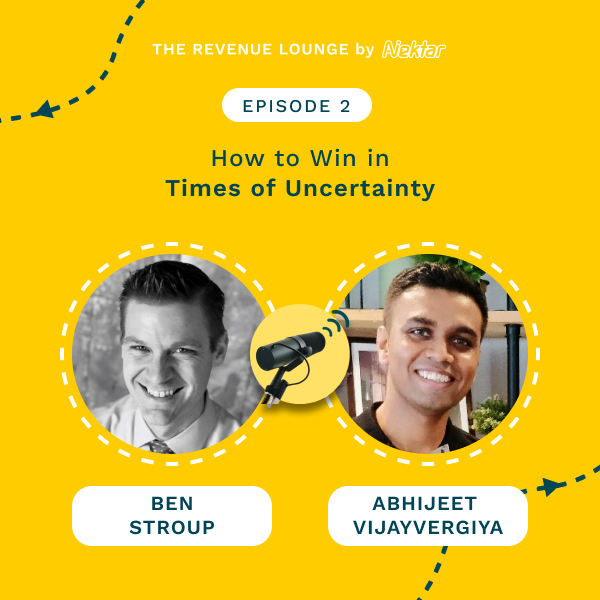
Ep #2: How to Win in Times of Uncertainty
Listen Now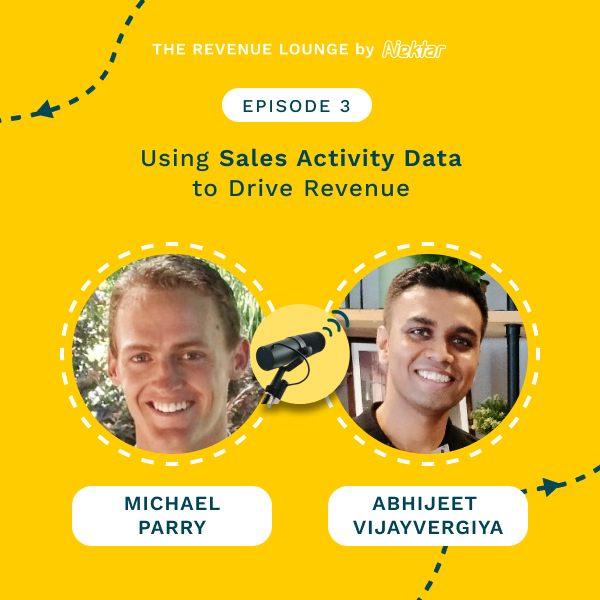
Ep #3: Using Activity Data to Drive Sales Productivity
Listen Now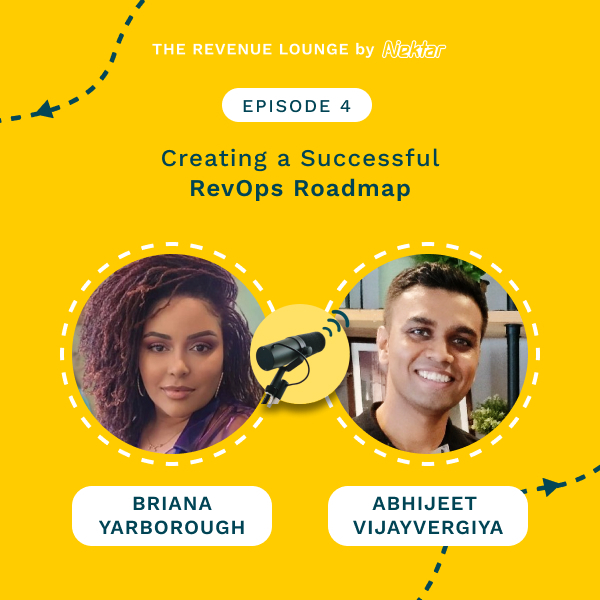
Ep #4: Creating a Successful RevOps Roadmap
Listen Now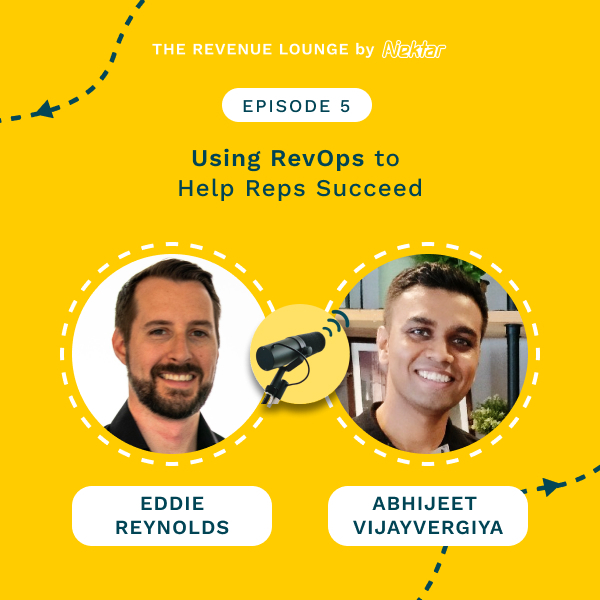
Ep #5: Using RevOps to Help Reps Succeed
Listen Now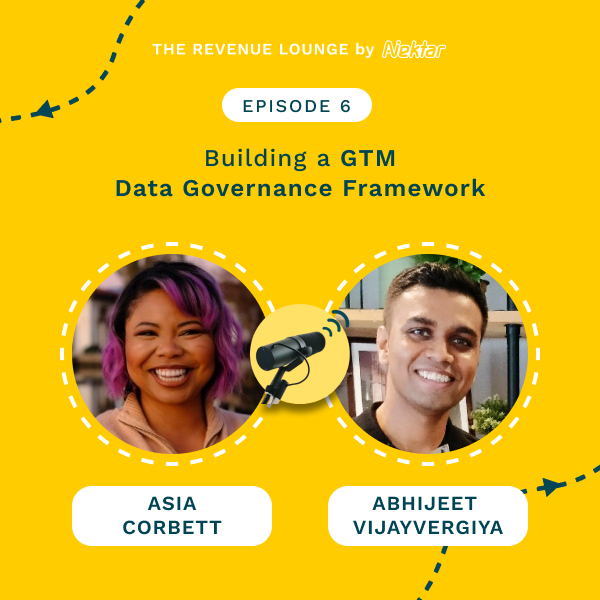
Ep #6: Building a GTM Data Governance Framework
Listen Now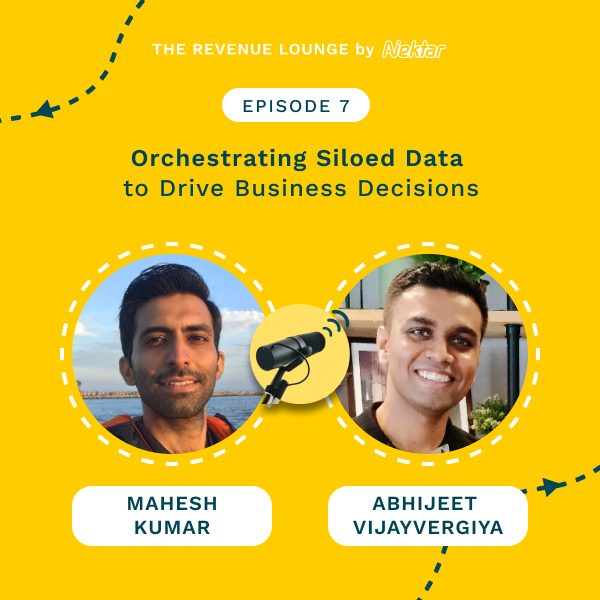
Ep #7: Orchestrating Siloed Data to Drive Business Decisions
Listen Now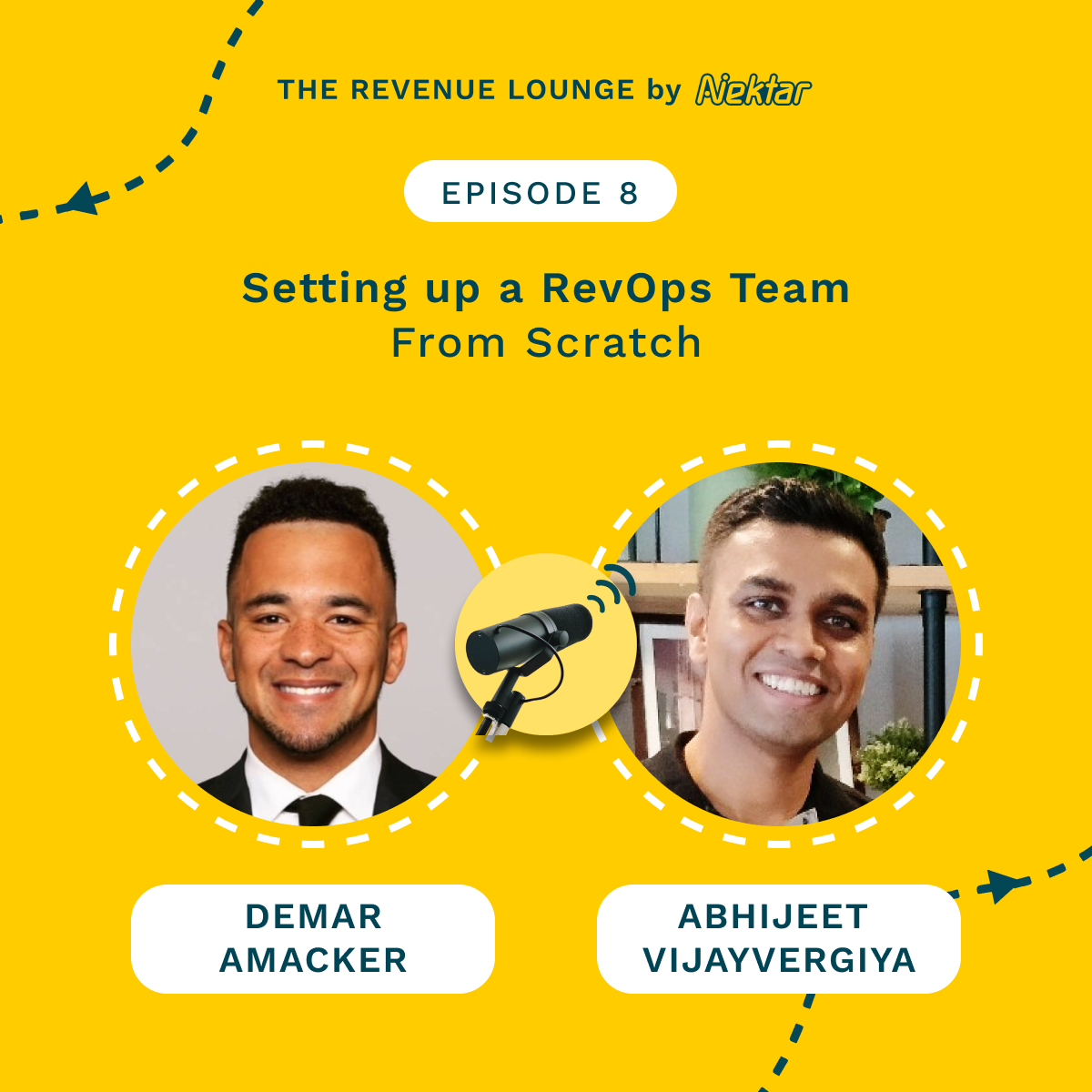
Ep #8: Setting Up a RevOps Team From Scratch
Listen Now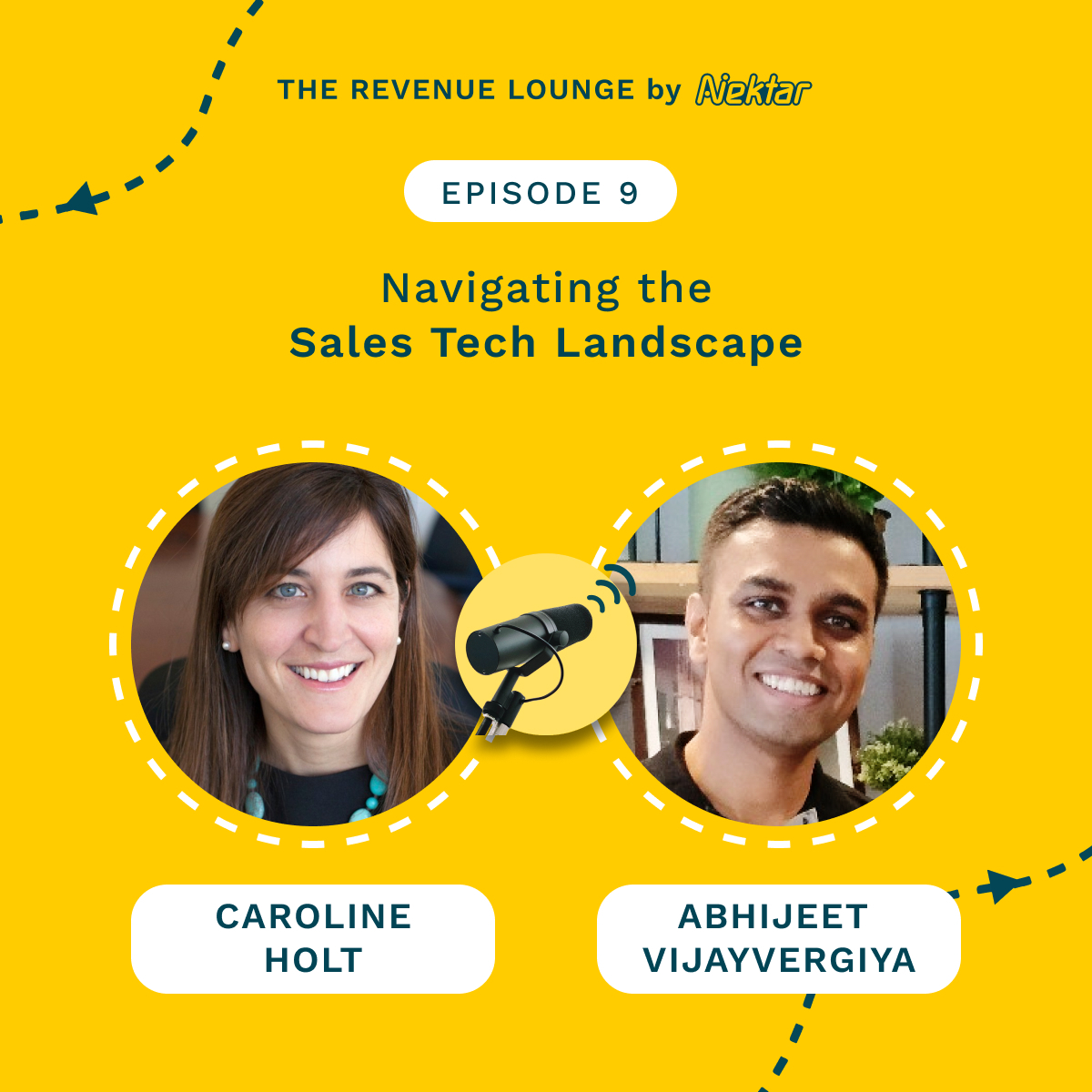
Ep #9: Navigating the Sales Tech Landscape
Listen Now